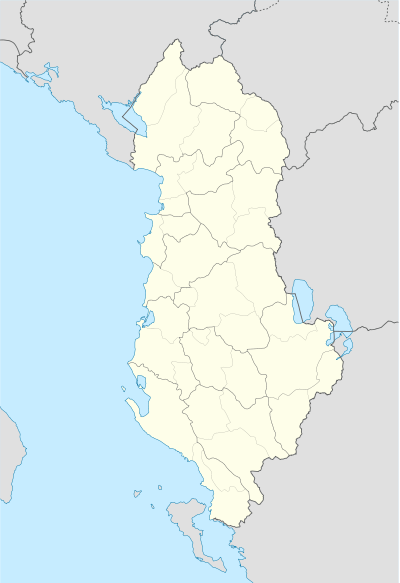Selcë e Poshtme
| Selcë e Poshtme | |
|---|---|
| Village | |
 Selcë e Poshtme | |
| Coordinates: 40°59′N 20°31′E / 40.983°N 20.517°ECoordinates: 40°59′N 20°31′E / 40.983°N 20.517°E | |
| Country |
|
| County | Korçë |
| Municipality | Pogradec |
| Administrative Unit | Proptisht |
| Time zone | CET (UTC+1) |
| • Summer (DST) | CEST (UTC+2) |
Selcë e Poshtme ("Lower Selcë") is a village located in the Mokra area, Korçë County, Albania. At the 2015 local government reform it became part of the municipality Pogradec.[1] Near the village, on the right bank of Shkumbin river at an elevation of 1,040 metres (3,410 ft) above sea level, 5 Royal Tombs of Selca e Poshtme are found. In 1996, Albania included the Illyrian royal tombs of Lower Selcë in the UNESCO World heritage list of proposals.[2]
History
Lower Selcë is a suggested location of the historic site[3] of Pellion, where in 335 BC Alexander the Great advanced his forces to attack the Illyrians, Thracians, Dardanians and other 'barbarians' following the death of Philip II thus securing Macedonia's northern border before leaving to conquer Asia.[4] It is considered to be the capital either of the Dassaretae or of the Ancient Greek[5] tribe of the Dexaroi and was later a Macedonian border fortress.[6] Alternative locations for Pelion include Zvezde near Korca or in Gorice.[7] In the area of modern Pogradec, Illyrians had started copying[8] the styles of the Macedonians. The area was the border between Chaonia and Illyria.
Notable People
Klement Tinaj - Actor
External links
References
- ↑ Law nr. 115/2014
- ↑ http://whc.unesco.org/en/tentativelists/909/
- ↑ The Illyrians (The Peoples of Europe) by John Wilkes, ISBN 0-631-19807-5, 1996, page 136, "Selce e Poshtme a candidate for the location of Pelion"
- ↑ Gilkes, O., Albania An Archaeological Guide, I.B.Tauris, 2012, ISBN 1780760698, p.263
- ↑ The Cambridge Ancient History, Volume 6: The Fourth Century BC by D. M. Lewis (Editor), John Boardman (Editor), Simon Hornblower (Editor), M. Ostwald (Editor), 1994, ISBN 0-521-23348-8, page 423, "These Dassareti not to be confused with the Greek speaking Dexari or Dessaretae lay between the Dardani and the coastal people of the Ardiaei,"
- ↑ The campaigns of Alexander by Arrian, Aubrey De Sélincourt, ISBN 0-14-044253-7, 1971, page 50, "Pelium was a Macedonian border fortress"
- ↑ Barrington atlas of the Greek and Roman world by Richard J. A. Talbert, 2000, ISBN 0-691-04945-9, page 755
- ↑ The Cambridge ancient history,Tome 6 by John Boardman, ISBN 0-521-85073-8, 1994, page 440
